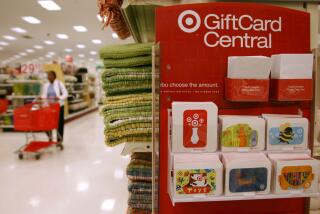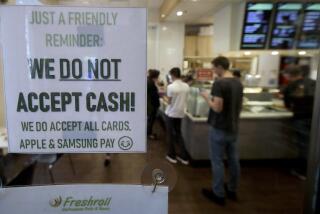Debit Card Use Is Taking Off in California, Nation
- Share via
For many shoppers, the question “paper or plastic?” is taking on a new meaning--that is, whether to use a check or a debit card.
After years of negligible popularity, debit cards are starting to seriously compete with checks, particularly as banks offer and promote combined ATM/debit cards that can be used anywhere that credit cards are accepted. Volume still pales next to cash, checks and regular credit cards, but debit card use is skyrocketing--up 63% this year, according to Visa spokeswoman Susan Forman. Visa is the leader in the U.S. debit card market.
“Debit cards have really taken off,” said John Hall, a spokesman for the American Bankers Assn.
In California, efforts by Bank of America and other financial institutions to promote debit cards is having an effect. “One of the interesting things about it is that although California is a newcomer to the check card market, it has rapidly become the leader in cash volume” this year, Forman said.
Debit cards pay merchants directly from consumers’ bank accounts. For many, debit cards can offer the convenience of credit cards without the temptation of racking up more high-interest debt.
“I use it everywhere, all the time,” said Robin Elkins, a Chicago-based consultant to international businesses. “You can catalog shop, you can grocery shop, you can buy airplane tickets or anything.”
By the end of last year, about 39.5 million debit cards had been issued bearing the Visa and MasterCard logos, more than double the 18 million in use at the end of 1993.
Analysts expect those numbers to keep growing as the cards become more popular with consumers as well as retailers, who often like the convenience of using credit-card-processing equipment for debit cards as well as the greater assurance that they will be paid.
The concept of debit cards is nothing new--they have been in use in some parts of the country for about a decade. But it has only been in the last few years that their use has soared.
“More merchants are taking the cards now, and that’s really the key,” said Rich Mitchell, editor of Debit Card News, a Chicago-based industry newsletter.
The Visa and MasterCard debitcard programs have raised the number of places they’re accepted worldwide into the millions. Equally important is how accustomed consumers have grown to electronic banking. People are “used to using their ATM cards for purchases,” said Irene Katen, a debit product manager at MasterCard in Purchase, N.Y.
After a debit card arrives in the mail--sometimes unprompted from the consumer’s bank--”people will try it out a few times, check to see that it went through all right,” Katen said, “and then the volume picks up as it becomes a payment habit.”
Many consumers say the chief attraction of debit cards is the convenience of paying for goods without cash, without racking up more debt. “For me, it’s taken over for checks and credit cards,” Elkins said. “Since I don’t like to have a lot on my credit cards, I use it mostly like a check, but it’s more widely accepted than a check,” she said.
Jay Lamm, a magazine editor in San Francisco, agreed. “There are no nasty surprises at the end of the month,” he said. “It’s kind of a self-limiting system.”
Consumers sometimes pay for that convenience, since some banks charge cardholders fees for each transaction. Those charges help make debit cards good business for banks. “Banks like it because they make a lot of money off it,” said Mitchell at Debit Card News.
It’s also good business for MasterCard and Visa, the two main credit card associations. The associations’ main functions are to process card charges and market the card services.
Even if consumers don’t pay transaction costs associated with the cards, retailers do. Merchants pay fees of as high as 2% of the total transaction for credit and debit charges processed through Visa and MasterCard, and some pay additional per-transaction fees.
Debit card business “is increasingly becoming important to MasterCard and our members,” Katen said.
Consumers who pay off credit card debt every month have less reason to use debit cards because they cost them the opportunity to earn the interest on their money. That 30-day “float” can also free cash for other bills.
However, debit cards can bring nasty surprises if they’re lost or stolen and the owners wait too long to report the problem to the bank. Cardholders are liable only for the first $50 of unauthorized charges on their card, as long as they have notified their banks within 48 hours after the loss is discovered.
Procrastinators could wind up taking a bigger hit in that situation than they would with a credit card. Debit card users’ liability goes up to $500 if they wait more than two days to alert their bank.
And whereas debit cards otherwise work a lot like cash, one of their good points is that they’re more resilient than paper. “I like it,” said Lamm, “because it doesn’t get all bleached out when I run it through the washing machine.”
Bloomberg Business News contributed to this report.
More to Read
Inside the business of entertainment
The Wide Shot brings you news, analysis and insights on everything from streaming wars to production — and what it all means for the future.
You may occasionally receive promotional content from the Los Angeles Times.










